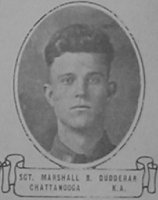OneManGang
Senior Member
- Joined
- Sep 7, 2004
- Messages
- 1,853
- Likes
- 8,240
Tennessee vs The Maxims vs Auburn
Nearly two score years ago, Your Scribe cadged two tickets to see UT play Auburn at Neyland. He had put his academic career on hold (yes, Virginia, he eventually did matriculate with a double major in History and Poli Sci) to oversee the construction of parks for Knox County. In any event, he had asked a comely young lass to be his companion that day and she had accepted. John Majors was in his third year and the results so far had been a bit uneven. Something clicked for Our Beloved Vols that sunny day in September and the Vols blew the stunned Tigers out of the stadium 35-10.
CharterVol's cartoon in the Daily Beacon the following Monday summed up the attitude of the Orange faithful. It showed the old scoreboard at the North End Zone and was captioned simply, “Happy days are here again.”
* * * * * * * * *
General Sir Henry Rawlinson was not a happy man.
The attack of 29 September across the St. Quentin Canal had worked but not as well as he had hoped.
Typical of Great War high commanders, he had over-promised and under-delivered. Scapegoats were needed and the Americans fit the bill. During the attack, the 27th Division had found itself confronted with uncut wire, strong German defensive positions and little tank support and had fallen about 1000 yards short of its objectives. Having never visited the front himself, Rawlinson nevertheless felt fully justified in berating American II Corps commander Major General G.W. Read and 30th Division commander Major General E.M. Lewis over their troops' lack of “tactical proficiency.” Now, in the opinion of this writer the idea that ANY British General of the Great War would have the gall to criticize ANYBODY'S tactical proficiency is just unbelievable.
In any event the Americans didn't kick back, they hunkered down and issued lengthy “Battle Instructions” detailing just how the units tasked with the “Big Show” now scheduled for October 7, would carry out their attacks. General Lewis put his boys from Tennessee and South Carolina in the vanguard. BG Tyson's 59th Brigade would jump off at “Zero Hour” set for 0510. For his part Tyson decided to send in the 117th Infantry on the left and the 118th on the right.
Logistical concerns forced Rawlinson to postpone his attack by 24 hours. Zero Hour was now 0510 on 8 October. However, once again, the Americans would have to capture their “start line.” In the case of 59th Brigade, this meant an assault on 7 October to advance about 500 yards east. The 3rd Battalion had only stumbled into line on the night of the 6th and the battalion commander came very close to insubordination in protesting thr orders but he was overruled and the attack went in. The Germans contested every inch of this preliminary attack by 3rd Battalion of the 117th. Col. Spence of the 117th noted several instances of personal valor in some notes he prepared for a project of the North Carolina State Archives this is but one:
“Sergeant Marshall B. Dudderar of Company K, who was directed by Capt. Binkley to take charge of his command when he was evacuated to the rear, had advanced about fifty yards. The increasing intensity of the enemy's machine gun fire was so great that Sergeant Dudderar was obliged to halt his platoon in the protection of a sunken road. Realizing the seriousness of the situation the Sergeant advanced alone some twenty-five yards to the right front in an effort to draw the machine gun fire, thus locating the machine gun nests which were causing the casualties among his men. He then led his men over the top and to the right where the men could advance with less conspicuousness. At this time Sergeant Dudderar was hit by a machine gun bullet and was severely wounded, but turning to Lieutenant Wyman, who had just advanced with another platoon, informed him of his injury stating that he had no intention of being evacuated. A few seconds later he was hit the second time. Although partially stunned, helpless and near death, he managed to call to Lieut. Wyman and tell him he was shot again and with his last breath said, 'Write and tell Mother..”
Sgt. Dudderar was awarded the Distinguished Service Cross for gallantry, posthumously.
During a stint at the Infantry School (Fort Benning) Capt. Nathaniel Callen of the 3rd Battalion was blunt in his criticism of the attack plan:
“I am sorry to relate here, however, that the Colonel (Spence) still felt it would be a reflection on the regiment if we did not make the attack and still insisted that it must be done. I frankly state , without meaning to criticize any higher authority, that none of the higher command, (who) had never felt the weight of fire from a well-disposed enemy, could visualize how serious this situation was.”
The preliminary attack succeeded, though, and now 2nd Battalion moved up to jump off at the next morning. The 1st Battalion would follow and 3rd after them.
The attack of 8 October went “over the top” on schedule at 0510. The British barrage made a great deal of noise but didn't do much to the German barbed wire. Fortunately, the ground was still in reasonable shape as the Germans had not had time to heavily fortify it. However, there was still nothing easy about it.
Sam Royall of the 118th Infantry recalled, “During the attack, the enemy had been using artillery and machine guns with telling effect. The artillery supporting us had followed the advance with great rapidity but, on account of faulty liaison, it was not always possible to use the guns as the exact position of the infantry was not always known.”
Capt. Reese Amis wrote, “In the face of furious resistance with all kinds of machine gun nests and an abundance of light artillery, the battalions advanced very rapidly, skillfully knocking out machine guns and maneuvering to the best advantage over the broken ground. The Second Battalion suffered heavy losses during the morning.”
The objective was the village of Premont about 5000 yards for the start line. The 2nd Battalion was in Premont by noon and the 117th dug in and consolidated its positions.
Night brought little rest as another attack was scheduled for the next morning to take the town of Busigny which was about 4000 yards further on. Col. Spence decided that, since the German main line was now in American hands, to attack in the order the battalions had ended the day with 2nd in front, 1st behind them and 3rd in reserve. However, the phone line to the 2nd Battalion failed and Spence decided to put 1st Battalion in the van. This sounds a lot simpler than it was. Indeed, this whole little switch was the subject of an essay in the Army's “Infantry In Battle” which became the “bible” of infantry operations for World War II.
German resistance was crumbling all along the British 4th Army front and American casualties for the last two days of the “Big Show” were mercifully light. However, the 117th Infantry paid a high price for its victory. Regimental records listed 34 officers and 1051 enlisted men killed wounded and missing during this attack.
Twenty-seven of Knoxville's sons fell during this one assault. The 8th of October 1918 is easily the bloodiest day of battle in the history of Knoxville and Knox County. In addition to those heroes four other Knoxvillians serving with other units died. One man died while onboard ship on his way to France and the other three fell in the tangled forests of the Meuse-Argonne.
A few of the markers at the National Cemetery in Knoxville stand out as, with special dispensations, some soldiers do have more personalized markers than others. Corporal Ralph Boles' (Headquarters Company, 117th Infantry, KIA 8 October 1918) marker is one of these. On it there is a sentiment that would seem to express all that these young men of the Great War and all our wars before and since, those who came back and those who did not, try to say to us through the mists of time:
“Tell them I did my bit.”
*********
So how did the team do compared to the Maxims?
1. The team that makes the fewest mistakes will win.
It would seem that those two interceptions by the Vols in the first half set the tone. Auburn was unable to generate enough firepower to put them away.
2. Play for and make the breaks. When one comes your way … SCORE!
Auburn owned virtually every game stat Saturday … except the one that mattered.
3. If at first the game – or the breaks – go against you, don’t let up … PUT ON MORE STEAM!
HeadVol Pruitt addressed this after the game, “There were times in the game where things didn't go our way. I didn't think we played very well at certain times in the game, but our guys kind of kept their poise. Fought a little bit harder.” The Gen'rul smiles.
4. Protect our kickers, our quarterback, our lead and our ballgame.
When Guarantano has enough time to make his reads, he is a very effective quarterback.
5. Ball! Oskie! Cover, block, cut and slice, pursue and gang tackle … THIS IS THE WINNING EDGE.
The intensity level was much improved over the Dawg Debacle. However, one issue has been bugging this writer. Tennessee has lost the services of Daniel Bituli for the first half agains Alabama for targeting. Now, when Your Scribe was playing back in the Age of Great Lizards he was taught by every coach he ever had that you NEVER ducked your head going into a tackle. This stupid stuff is seen at every level, what has changed? Worse, Jonathan Kongbo is down with a knee injury.
6. Press the kicking game. Here is where the breaks are made.
Tennessee's kickers are performing beyond expectations. Joe Doyle is shaping up to be a worthy successor to Weaver, Clabo, Widby, various Colquitts ,and other Vol greats.
7. Carry the fight to Auburn and keep it there for sixty minutes.
Despite that late Auburn TD, the Vols fought the whole way.
It's about d*mned time!
Long time readers know that teams have to learn how to win big games. Our Beloved Vols took a HUGE step in the right direction Saturday.
MAXOMG
© 2018 Keeping Your Stories Alive
Suggested Reading:
Capt Reese T. Amis, Knox County in the World War
Harding, Maj. Edwin F. (ed), Infantry in Battle
Mitchell Yockelson, Borrowed Soldiers
"Little crosses stand above the dead. They seldom stand alone. Men see to that." - Elton Mackin





